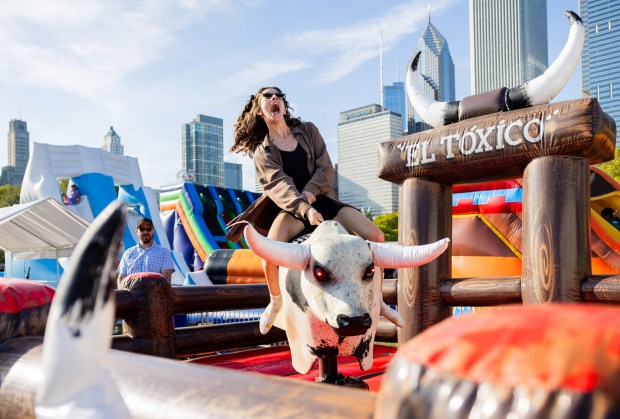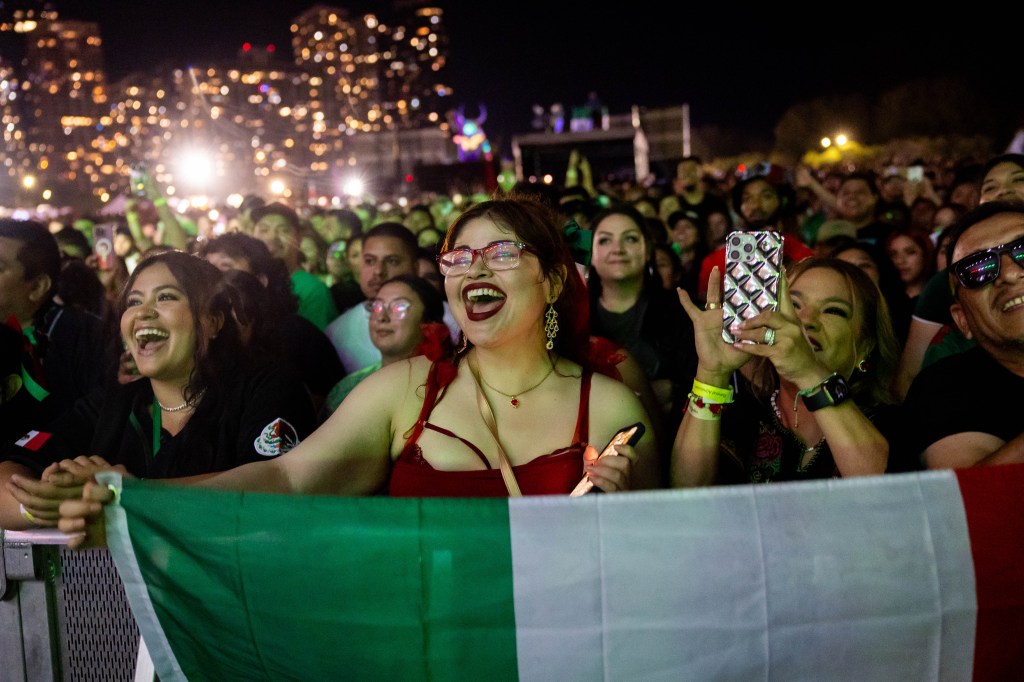Organizers of El Grito Chicago, a two-day Mexican Independence Day festival that was scheduled to take place downtown Chicago next weekend, have announced that the event will be postponed as the city braces for increased immigration enforcement from the federal government.
German Gonzalez, the event’s lead organizer, told the Tribune that organizers chose to postpone the Sept. 13-14 festival following safety recommendations from the state of Illinois, Chicago city officials and community leaders. Last year, 24,000 people attended the celebration.
Gonzalez said the decision was made to prioritize the safety and well-being of a community that could be at risk of being targeted.
“It’s a real sadness what is happening, but we strongly feel like this is the right decision (to cancel the event),” Gonzalez said. He added that the reaction has been “overwhelmingly positive and hopeful.”
Gov. JB Pritzker said he expects immigration enforcement to begin in Chicago by the end of the week, and suburban officials have been told to expect about 300 immigration agents to be sent to the area as part of increased operations.
During a news conference Tuesday, Pritzker suggested that Stephen Miller, Trump’s deputy chief of staff, strategically planned to conduct militarized arrests in Chicago because the city is known for its Mexican Independence Day celebrations.
Pritzker added that he is “deeply concerned” that U.S. Immigrations and Customs Enforcement will target Mexican Independence Day events, set to start this weekend with the parade in Pilsen on Saturday. On Thursday, parade organizer Vicky Lugo said the upcoming celebration will go on despite deportation fears.
Lugo said she hadn’t heard that the El Grito festival was postponed before being reached by a Tribune reporter. She called it a “shame.”
“We are confident that nothing is going to escalate, nothing’s going to happen,” said Lugo, secretary of the United Merchants of Pilsen Chamber of Commerce. “We’re not changing plans anytime soon.”
The 24th annual parade, which about 3,000 spectators are expected to attend, has a few extra precautions in place, Lugo said. Volunteers placed along the parade route who will communicate if they see immigration agents and will hand out “know your rights” cards, she said. She previously said the Chicago Police Department will help ensure safety.
“It’s not because we’re downplaying the situation,” she said. “But it would be highly irresponsible of ICE or the National Guard or just anyone to make some kind of action specifically because there are kids, there’s families out there. And if they were to create chaos, it would put many people’s lives in danger.”
Reyna Torres Mendivil, the consul general of Mexico in Chicago, said representatives from the consulate were scheduled to attend at least 17 celebrations in Illinois and Indiana this month, including El Grito.
On Thursday evening, the team was reviewing how many events had been canceled or postponed, Torres Mendivil said.
“We respect the decision they make. Some events may still take place in enclosed places, but there are others that take place in public spaces,” Torres Mendivil said. “We will attend all of the events that are still set to take place.”
The consulate will focus on commemorating Mexican Independence Day with a social media campaign that showcases the contribution of the immigrant community on social media, she said.
“Nothing of what may happen negates the pride of being Mexican and of celebrating our heritage, with our family, with dignity and respect,” Torres Mendivil added.
“It is shameful that the President’s reckless, militarized immigration enforcement tactics have forced organizers of El Grito to postpone the celebration this year,” a spokesman for Chicago Mayor Brandon Johnson said in a statement Thursday evening. “While we are saddened that the celebration will not take place as expected, we respect that the organizers are doing what they believe is in the best interests of the city and the Mexican community. We will continue to work with the organizers of El Grito and other Mexican Independence Day events this month to support and promote safe celebrations.”
 Libby Ebeling rides a mechanical bull at El Grito Chicago at Grant Park’s Butler Field in Chicago on Sept. 14, 2024. (Tess Crowley/Chicago Tribune)
Libby Ebeling rides a mechanical bull at El Grito Chicago at Grant Park’s Butler Field in Chicago on Sept. 14, 2024. (Tess Crowley/Chicago Tribune)
El Grito Chicago was launched last year as a vibrant, family-friendly celebration of Mexican culture and heritage, and also as alternative to help regulate the car caravans that had taken over the streets in recent years in the days leading up to Mexican Independence Day.
Gonzalez said the event combats the perception of Mexican festivities in Chicago, which are “too often clouded by ignorance.” He noted that there were zero incidents last year.
“The Cry of Independence,” or “El Grito,” as it is translated, is the traditional ceremony paying homage to the traditional call to arms on the eve of Mexican Independence Day on Sept. 16, 1810, and the fight for independence from Spain.
Cultural events help anchor all communities, immigrants included, and when they’re canceled, it can create feelings of loss and grief, said Aimee Hilado, an assistant professor at the University of Chicago and an expert in immigrant mental health and immigration trauma.
Celebrating traditions brings “joy” and “connection” to many people, she said.
“Coming together is a natural way of feeling connected to others, of feeling safe,” Hilado said. “When we have to cancel cultural events … it just creates more isolated communities.”
She said feelings of fear and uncertainty are likely heightened for many immigrants due to the possibility of an increased immigration enforcement presence. Communities may find different ways to stay connected and hopeful amid the uncertainty, such as virtual Masses or having a neighbor walk a child to school, she added.
“It is a stark reminder of the reality that they are living in at this time, that the threats to their safety and security in this country are quite real,” Hilado said. “You don’t build stronger communities when communities live in fear.”
On social media, El Grito organizers vowed to return stronger and more united, thanking the vendors, artists, sponsors and community groups who have supported the festival.
“Postponing El Grito Chicago this year is not surrender,” Gonzalez told the Tribune. “It is a refusal to let our festival be used as a pawn in political games meant to divide our city and our nation.”
Originally Published: September 4, 2025 at 5:51 PM CDT
